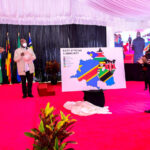Nothing rankles more in the human heart than the feeling of injustice[1].
I. INTRODUCTION
More people than ever need legal aid services. But the corona pandemic has hit legal aid funding severely. On 11th March, 2020, the World Health Organization (WHO) declared the Novel Coronavirus (COVID-19) disease outbreak a global pandemic.[2]
The government measures to the COVID-19 such as the travel bans and suspension of court and legal activities will potentially result in decline of access to justice for the indigent and worsen the Rule of Law in Uganda. Uganda’s ranking on Rule of Law is declining with the minimal nongovernmental checks and the low access to justice for the indigent. Therefore, Legal aid in the Covid-19 pandemic needs to be revisited. Belatedly, lawyers were classified as “essential services” during the pandemic. There is concern that legal aid may die out and access to justice for the indigent will become problematic during the acute lockdowns among other Government control measures. This article provides insights into other nongovernmental checks for public interest advocacy to promote Rule of Law during pandemics in the face of declining legal aid.
II. LEGAL AID IN UGANDA
In Article 28 (3) (e) of the 1995 constitution, Uganda has established the provision of legal aid services for capital offences. Under the Poor Persons Defense Act 2000, the right to legal aid is limited to High Court cases. The Advocates (Amendment) Act 27 of 2002 and the Advocates (Student Practice) Regulations, 2004 establish pro bono legal services as a part of legal aid.
Although Article 21 of the 1995 constitution provides for the right of equality of persons….equal access to courts of law, Uganda lacks a unified national legal Aid scheme[3]. There are various state legal aid players such Ugandan Human Rights Commission, Uganda Law Council, Administrator General, Justice Centers Uganda (pilot project of Justice, Law and Order Sector) and the Judiciary State Brief Scheme. The state legal aid service providers may create synergies with nonstate actors to avoid duplication of legal services in the pandemic. In a study by S.M Huang-thio, he concluded that it should not be difficult for the Malayan courts to construe article 8(1) and 5 (3) of the Malayan constitution as imposing an obligation on the Federation Government to provide an adequate system of legal aid[4]. These provisions are similar to Article 28 (3) (e) and 21 (1) and (2) of the 1995 constitution of the Republic of Uganda. Knowing that the state has an obligation to provide legal aid, it can be a starting point for public interest litigation to hold government accountable for failing to establish a legal aid scheme in the future. A lawyer plays a vital role in the administration of justice as an advocate for public interest and legal aid.[5] John Mary Mugisha argues that every lawyer is duty bound to provide his or her time and/or money towards public interest work[6]. For over 59 years, Uganda lacks a legal policy nor Legal Aid Law to regularize legal aid practitioners in this nation[7]. J.B. Byamugsha (1971) observed that capitalist poor seem always to regard courts, lawyers and the law as the preserve of the wealthy. Expenses of going to court are high. Legal aid has been resorted to in some places, but this is conceded to be only a palliative and not a cure[8]. It was rather unfortunate that Uganda’s Legal Aid Bill 2020 had not been passed at the time of the COVID-19 pandemic.
Uganda has a $520 million justice, law and order budget for a population of 43 million.[9] Unfortunately, the budget does not cater for other legal aid services [10]. Uganda spends 860 million under the State Brief System which covers only capital offences[11].
Since a large section of the Ugandan society cannot afford legal services due to conditions of extreme deprivation, there is need to revisit the legal aid during the COVID-19 pandemic.
III. Covid-19 Legal Policy, Legal Aid and The State of Rule of Law
The Public Health (Control of COVID-19) Rules, 2020 S.I. No.52 of 2020 prohibit community organizing thus negatively impact access to justice for the indigent. This may worsen the Rule of Law in Uganda. Here are some of the effects of COVID-19 measures on the Rule of Law and legal aid.
Firstly, Lawyers are now Essential Services during pandemics: Legal Aid Service Providers[12] petitioned the Government to classify legal services as essential services amidst the COVID-19 pandemic lock down.
In the case of Turyamusiima Geofrey versus Attorney General & Dr. Jane Ruth Aceng[13], the court ruled that the respondent provide modalities stating the mechanisms in deserving which advocates may utilize for access to clients, so as to guarantee that the right to a fair hearing; and the right to an order of habeas corpus (as stated under Article 44 of the constitution) are preserved[14]. Thus, the legal aid service providers can contribute to national development during the pandemics.
Secondly, Court hearings suspended can be conducted online: Some argue that suspending court activities will increase court case backlogs and thus delayed justice is denied justice. Suspension of community organization during lockdowns can be solved through Television and Radio outreach models. The intended beneficiaries of legal aid and legal awareness campaigns are required to social-distance and during lockdowns they cannot even attend these legal awareness events due to travel restrictions banning on public transport.
Thirdly, scarcity of resources for legal aid may limit access to justice for the indigent.
The inadequacy of legal aid is primarily caused by the scarcity of resources by legal aid practitioners. Several economies have been set back and there are limited funds to support the legal aid programs[15]. Meanwhile, chronically under-resourced justice institutions, many of them operating at reduced capacity due to the pandemic, risk falling even further behind.
Fourthly, Rule by Decree (Emergency powers) for the Executive arm of government can be overcome through advocacy. During the pandemic, the parliament and the Judiciary were rendered passive participants. Across a majority of states globally, the executive has been the key driver of action taken in response to the pandemic. This is both unsurprising and can be justified on the basis of the need for urgency of action which may not be delivered nor guaranteed by the legislature in a timely manner. These emergency powers are a threat to the Rule of Law.
IV. REMEDIAL ACTION
The creation of medical-legal partnerships to address health-related legal needs, including for example legal health checks in hospitals. In New South Wales, there is a (National Center for Medical-Legal Partnerships) which supports government health authorities.[16]. This is important for the Bar associations of Uganda and East African region to ensure access to health-related justice. This is because medical-legal partnerships can enable the government to detect, address and prevent health-harming social conditions that have their roots in legal problems, and to help secure healthcare coverage by avoiding or resolving erroneous administrative denials of benefit.
Having classified lawyers Essential services in the Coronavirus pandemic, the government may consider transportation for legal aid practitioners during the pandemic just as there is state-funded transportation for the COVID-19 health teams.
POSSIBLE SOLUTIONS
A proposal to establish an Emergency legal Aid Fund to support legal services in the pandemic. This calls for revision of the budgetary allocations to include Legal Aid Services under the Ministry of Justice and Constitutional Affairs. According to the Hiil Report, delivering justice is mostly a matter of resources. The Legal Aid Fund at the initiative of government is much-need to fill the financial gap for access to justice.
A proposal to use community paralegals to respond to injustices in the communities. Serving as grassroots advocates, they act as first responders to injustice in their communities. In 2016, South Africa committed to institutionalizing Community Advice Offices (CAO) as part of its wider justice network as a means to advance access to justice. Uganda has Paralegal Advisory Services which is supported by external funding yet this initiative can be expanded by JLOS.
A proposal to create an independent legal aid authority/body that can establish, fund, staff, regulate, and evaluate the legal aid scheme.[17] Legal aid service delivery model may be based on public -private partnerships between the state and nonstate actors. For instance, Kenya has a National Legal Aid Service established under the Legal Aid Act 2016. Ghana has the Legal Aid Commission established as the Public Defenders and governed by the Legal Aid Commission Act 2018.
A proposal to use the Law clinics model: Revise legal profession regulations to enable law students under the supervision of licensed advocates to provide legal services to low-income and underserved individuals through law school clinics or with civil society organizations.
[1] R.H. Smith. Justice and the Poor (1919) pp. 1, 10. Cited by S.M.Huang-Thio “Legal Aid- A Facet of Equality before the Law”. The International and Comparative Law Quarterly Vol. 12 by the British Institute of International and Comparative Law.
[2] https://www.who.int/news-room/detail/27-04-2020-who-timeline—covid-19
[3] See the Draft National Legal Aid Policy 2011 at https://www.jlos.go.ug.>filePDFDraftNationalLegalAidPolicy-The Justice,LawandOrderSector accessed on 29th July, 2021
[4] Article 8 (1) and 5 (3) of the Malayan constitution are similar to article 21 and 28 (7) of the 1995 constitution respectively See S.M.Huang-Thio “Legal Aid- A Facet of Equality before the Law”. The International and Comparative Law Quarterly Vol. 12 by the British Institute of International and Comparative Law.
[5] A role of a lawyer as a crusader for public interest litigation and legal aid
[6] Tripartite partnership in the Effective Administration of Justice in Uganda: The Judiciary, Civil Society Organizations and the Advocate: the case for the advocate Uganda Law Society Law Review No. 1 of 2000-August, 2000
[7] Uganda has international obligations to provide legal assistance under Article 14 (3) (d) of International Covenant on Civil and Political Rights, Article 17 o Covenant own the Rights of the Children, Article (2) (c) of CEDAW on rights of women to legal aid, Article 7 (1) (c) of the African Charter on Human Rand People’s Rights
[8] J.B. Byamugisha (1971) Legal Nationalism in Uganda. Makerere Law Journal Vo. 1 No. 1 of 1971 at pg. 81
[9] See CHARGING FOR JUSTICE SDG 16.3 Trend Report 2020 by HiiL user-friendly justice
[10] According to the FY 2019/20 (% OF JLOS SECTOR BUDGET), these were the budgetary allocations: the Director of Government Analytical Laboratory 1% NIRA 4%, Judicial Service Commission 1%, Ugandan Prisons 14%, Uganda Police Force 52%, Ministry of Justice and Constitutional Affairs 10%., Ministry of Internal Affairs 2%, Law Reform Commission 1%, Office of the director of Public Prosecutions 2%, Uganda Registration Services Bureau 1%, National Citizenship and Immigration Control 2%, Uganda Human Rights Commission 1%, Law Development Center 1%. It is noteworthy that no money was committed to legal aid.
[11] Draft National Legal Aid policy ibid
[12] This petition was led by the Legal Aid Service Providers Network a national member-based Nongovernmental organization of 55 legal Aid Service Providers (LASPs) spread acro80 districts in Uganda.
[13] Miscellaneous Cause No. 77 of 2020 High Court of Uganda at Kampala
[14] This court order was overtaken by events since the blanket ban on Advocates was lifted this situation was faced in rest of East Africa
[15] https://www.moorelegaltechnology.co.uk/insights/business-innovation-for-lawyers/the-greatest-legal-sector-challenges-and-opportunities-2017-2027.html The Greatest Legal Sector Challenges (and Opportunities) 2020-2030>accessed on 10th June, 2021
[16] Cited in ACCESS TO JUSTICE AND THE COVID-19 PANDEMIC © OECD/ LAW & JUSTICE FOUNDATION OF NEW SOUTH WALES 2020
[17] UN Office on Drugs and Crime, UN Principles and Guidelines on Access to Legal Aid in Criminal Justice Systems, Guidelines 12, 13, and 15 cited by Open Government Partnership Global Report DEMOCRACY BEYOND THE BALLOT BOX-Justice Policy Series, Part I Access to Justice accessed at https://www.opengovpartnership.org/ campaigns/global-report/. On 15 June, 2021
The Open Government Partnership (OGP) provides an opportunity for government and civil society reformers to make government more transparent, participatory, and accountable.
This post was created with our nice and easy submission form. Create your post!





